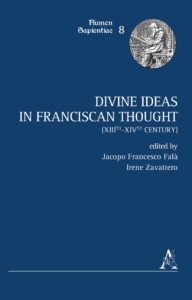 This volume presents a series of papers on the 13th and 14th century Franciscan debate on divine ideas. Most of the principal Franciscan authors of the time are considered: from Alexandre de Hales and the first Franciscan masters of theology to the late-14th-century thinker John of Ripa, including Bonaventure of Bagnoregio, John Duns Scotus, Peter John Olivi, Petrus de Trabibus, James of Ascoli, William of Ockham, William of Alnwick, Petrus Thomae, Peter Auriol, Hugh of Novocastro, Landulph Caracciolo, and Francis of Meyronnes. Their doctrines are carefully analysed and contextualised within the general frame of 13th- and 14th-century Franciscan theology.
This volume presents a series of papers on the 13th and 14th century Franciscan debate on divine ideas. Most of the principal Franciscan authors of the time are considered: from Alexandre de Hales and the first Franciscan masters of theology to the late-14th-century thinker John of Ripa, including Bonaventure of Bagnoregio, John Duns Scotus, Peter John Olivi, Petrus de Trabibus, James of Ascoli, William of Ockham, William of Alnwick, Petrus Thomae, Peter Auriol, Hugh of Novocastro, Landulph Caracciolo, and Francis of Meyronnes. Their doctrines are carefully analysed and contextualised within the general frame of 13th- and 14th-century Franciscan theology.
Jacopo Francesco Falà studied at the Universities of Rome “Sapienza”, Bari, Coimbra, and Macerata. He defended a PhD dissertation (2017) on Collationes Oxonienses and collaborated on the critical edition of this text. His main interests concern the medieval debates on the univocity of the concept of being, the ontological status of essences and divine ideas – focusing especially on Henry of Ghent, John Duns Scotus and the English Franciscans of the early 14th century. He has published contributions on these issues and on Franciscan economic thought.
Irene Zavattero is research associate (Rtd-B) in History of Medieval Philosophy at the University of Trento. She is a specialist of medieval ethics and investigates particularly the reception of Aristotle’s ethic thought in the 13th and 14th centuries. She has published numerous works on the earliest 13th-century Latin commentaries on the Nicomachean Ethics. She is the author of the critical edition of Berthold of Moosburg’s Expositio super Elementationem theologicam Procli, propositions 66–107 (2003), and, together with Coralba Colomba, of Ulrich of Strasbourg’s De summo bono, VI, 4, 1–15 (2017), both published in the series Corpus Philosophorum Teutonicorum Medii Aevi.
Contents:
- Irene Zavattero, In Augustine’s Footsteps. The Doctrine of Ideas in Franciscan Thought. Introductory Remarks (pag. XI-XXVII)
- Riccardo Saccenti, Sic bonum cognoscitur et similiter lux. Divine Ideas in the First Franciscan Masters (Alexander of Hales and John of La Rochelle) (pag. 1-24)
- Massimiliano Lenzi, La negazione delle idee e l’“oscurantismo” dei filosofi. Bonaventura critico di Aristotele (pag. 25-49)
- Stève Bobillier, Divine Ideas and Beatific Vision by Peter John Olivi (pag. 51-73)
- Timothy B. Noone, Carl A. Vater, The Sources of Scotus’s Theory of Divine Ideas (pag. 75-99)
- Jacopo Francesco Falà, Divine ideas in the Collationes oxonienses (pag. 101-133)
- Ernesto Dezza, Giovanni Duns Scoto e gli instantia naturae (pag. 135-159)
- Marina Fedeli, Le idee divine e la relazione di imitabilità dell’essenza in Giacomo d’Ascoli (pag. 161-176)
- Davide Riserbato, Ut induit rationem ideae. L’essenza divina e l’essere intelligibile: identità (e differenza) secondo Guglielmo di Alnwick (pag. 177-201)
- Chiara Paladini, Exemplar Causality as similitudo aequivoca in Peter Auriol (pag. 203-238)
- William Duba, Roberta Padlina, Christopher Schabel, From Scotus to the Platonici: Hugh of Novocastro, Landulph Caracciolo and Francis of Meyronnes (pag. 239-369)
- Garrett Smith, Petrus Thomae on Divine Ideas and Intelligible Being (pag. 371-399)
- Alessandro Ghisalberti, Le idee divine in Guglielmo di Ockham (pag. 401-426)
- Andrea Nannini, Immensa exemplaritas. La dottrina delle idee nella metafisica di Giovanni da Ripa. I Sent., d. 35 (pag. 427-459)
- Alessandro Domenico Conti, Late Medieval Exemplarism. A Philosophical Assessment (pag. 461-487).